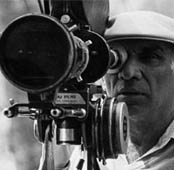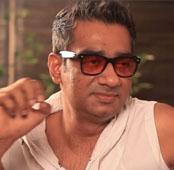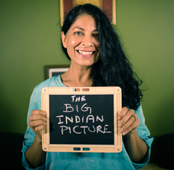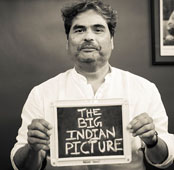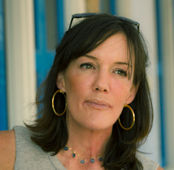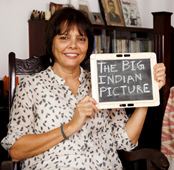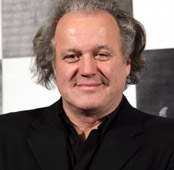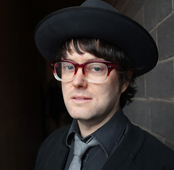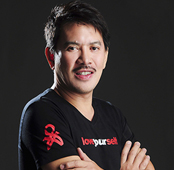-
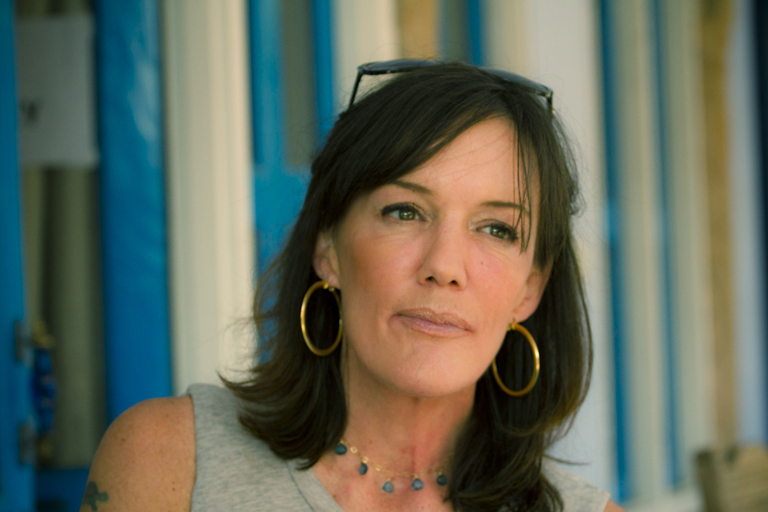 Zoe Heller | Kavi Bhansali for The Big Indian Picture
Zoe Heller | Kavi Bhansali for The Big Indian Picture -
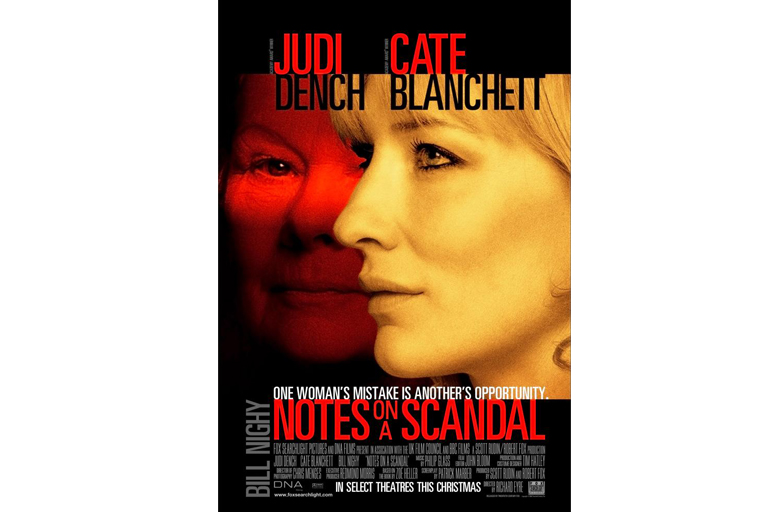 Poster of Notes On A Scandal
Poster of Notes On A Scandal -
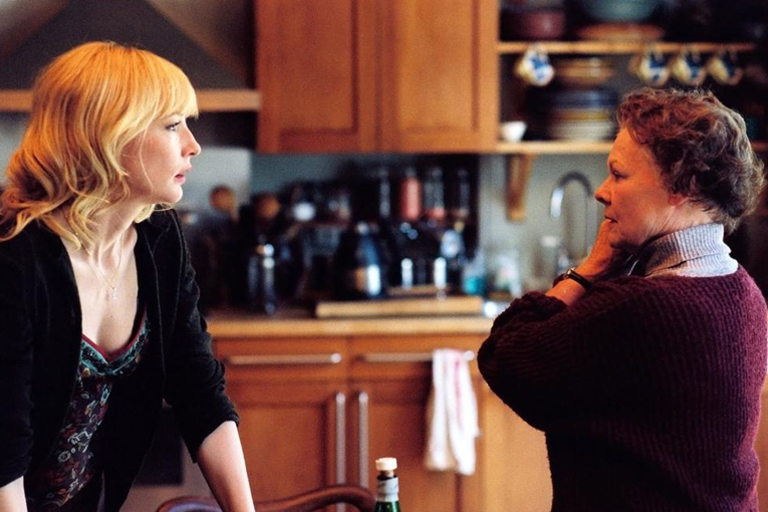 A still from Notes On A Scandal
A still from Notes On A Scandal -
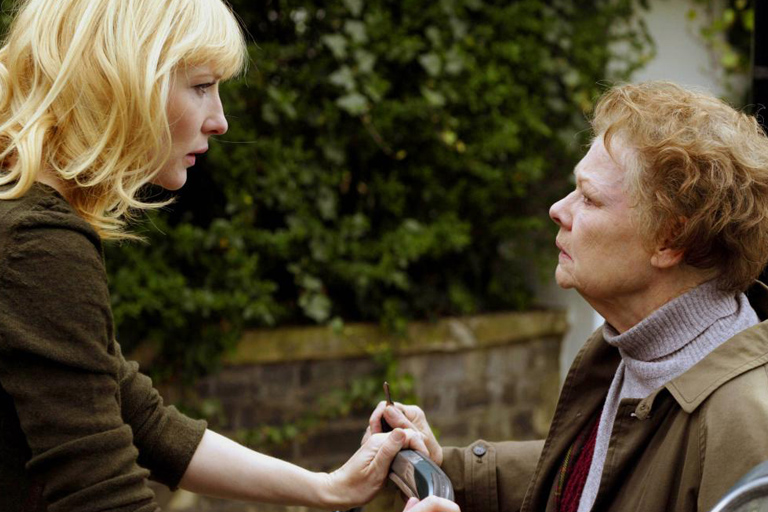 A still from Notes On A Scandal
A still from Notes On A Scandal
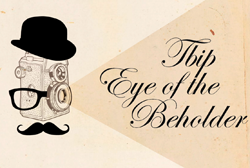
New York based English writer and journalist Zoë Heller, 48, is the author of three novels: Everything You Know (1999), Notes on a Scandal (2003)—which was shortlisted for the Man Booker Prize—and The Believers (2008).
She was ‘Columnist of the Year’ at the British Press Awards for her columns in the Daily Telegraph in 2002. In 2009, she donated her short story What She Did On Her Summer Vacation to Oxfam’s ‘Ox-Tales’ project, four collections of UK stories by 38 authors.
Heller belongs to a family of screenwriters. Her father Lukas Heller had won an Edgar Award for Best Motion Picture for the thriller Hush… Hush, Sweet Charlotte. Her brother Carl Bruno Heller is the creator of the TV series Rome and The Mentalist. Her ex-husband Larry Konner has penned Hollywood screenplays such as Superman IV: The Quest for Peace, Planet of the Apes and Mona Lisa Smile as well as the TV shows Boardwalk Empire and The Sopranos.
The only movie Heller wrote was way back in 1991. “I haven’t seen it since,” she says. “And I wouldn’t want to.” However, a film based on her book Notes on a Scandal, starring Judi Dench and Cate Blanchett, written by Patrick Marber and directed by Richard Eyre, won rave reviews and was nominated for four Academy Awards.
In this interview, Heller speaks about the challenges of screenwriting and adaptation, reservations she had with the film Notes on a Scandal and a TV screenplay she is working on currently.
You wrote a screenplay for the independent film Twenty-One way back in 1991. Have there been any scripts or screenplays since?
I am writing now for HBO. Something for TV, but no films. I haven’t written for films since then. Because I come from a family of screenwriters…
I know, your brother (Bruno Heller) writes for TV…
My brother writes for TV, and he also writes for movies. And my father and my ex-husband and so on… First of all I’m aware of how difficult it is, and it’s never seemed to me that it was my métier. I actually like sentences and aspire to write good ones. The particular skills that screenplays require, it always seems to me like there are more architectural skills involved. And it is also a more visual medium, obviously. They always struck me as things that possibly, you know… if I worked really hard, I might become competent at, although I didn’t have a natural flair for it. However, I’ve had the very good fortune to be offered this work with HBO. And I need to pay the bills, so I’m trying.
How was your experience with that particular screenplay (Twenty-One)? Because it did go on to win a lot of acclaim. The film won awards, it was at Sundance and created quite a stir there.
Between you and me, I was a completely know-nothing ignoramus.
It was way back in the day.
I mean, I haven’t seen it since, and I wouldn’t want to. The screenplay, I can only imagine, was fairly incompetent. So that was a piece of immense good fortune. Somebody used to say, “Oh, you’re around the age of the person I want to make this movie about. You write it.” And the director—I wouldn’t say he dictated it to me—but he said, “Now I want a bit in which she utters a monologue about what it’s like having a boyfriend”, or something.
So the sort of skills I was talking about just now, about how you structure something. You know, were not in it at all. So I wouldn’t say that experience taught me anything. I neither brought any skills to bear, nor did I pick any up in the process. It’s the truth.
You didn’t work on the script of Notes on a Scandal ?
No. A great guy, a great playwright, Patrick Marber, wrote that script. They’re very keen these days that when they adapt a book, that they kind of keep the writer on the side. Otherwise you have the writer standing around saying, “Nooo, I hate it!” And that’s not good for the movie. They were very nice to me and they kept me abreast of what they were doing. As it turned out, I had a great friendship with Patrick and he said from the start, “You’re going to hate what I do. I’m going to take your baby and I’m going to tear it up and change it.”
But I like Patrick very much. I think he’s very, very smart. I understood that in order to adapt a book, you can’t do sort of an illustrated version. It’s turning it into a different medium. I have reconciled to that. So I watched them do that. They showed me a first draft and said, “Please give us your notes.” I innocently give them copious notes, which they then went ahead and ignored. I watched it with interest, and I thought that the movie that came out really worked on its own terms. If my book had ceased to exist as an independent object, no one could ever kind of go and look at the original document… I think I would be disturbed. Because the movie is so different. But my book is still my book and the film is something else. So I’m fine with that.
But letting go at that point, when you knew that somebody else would be working on the script. Was that a tough choice…
No…
…or was it something you were sort of (okay with)?
First of all, you’re being given… I mean at one level, as a writer there’s something magical about being given a cheque and not having to do any writing!
Absolutely.
And the other thing is, I think it’s particularly difficult to adapt one’s own work. I know some writers do. They even relish it. I think it would be… for all the reasons that I said, the whole business of having to tear up what you’ve done and rearrange and think about it in a completely different way. And of course, lose some of one’s favourite lines because it simply doesn’t work. They don’t work in the screen version. I think it would be quite painful. So I was very happy to not enter into that.
You mention not being very pleased with the happy ending to the movie, which was not the case in your book. How did they convince you? You mention sort of expressing your doubt about that, but then you were finally convinced. What did they say to convince you finally?
No I wasn’t convinced. I was talking to the producer. He was a very smart guy who made a lot of successful movies. And he said, “People aren’t going to put down… ”—I guess in those days it was 10 bucks—“…aren’t going to put down 10 bucks to go see a movie in which people don’t learn something.” It was a kind of a classic Hollywood homily about the idea that a movie has to have an arc, and the characters have to go through a journey and be better in some sense at the end. Of course, literary fiction doesn’t actually keep to quite the same rules. My feeling is that I’m not sure that all independent movies have to keep to the same rules either. I don’t think he persuaded me exactly, but I said, “Okay, you’re going to make a different kind of a movie.”
You also mentioned about not being very sure of how Barbara came across in certain places. Could you elaborate on that? What did you mean by that?
I felt that I had written about, obviously, an awful woman, and a woman going slightly nuts. But she had a real story to tell and a real complaint about the plight of a middle-aged woman who had no role and wasn’t seen by men or women. Who felt herself to be invisible. There was a sort of, if you like, a feminist moral in there somewhere about what happens to women who don’t offer pulchritude or beauty, who reach a certain age. (Women) who don’t have the status of marriage or children.
I felt that in the movie she was a much more straightforwardly crazy villain. And her sexuality was much more unambiguous. I never wanted to say she’s a lesbian. I felt that she was sort of truly sexually ambiguous, that she was sort of retarded sexually. She wanted sex with intimacy with anybody. She wanted intimacy with anybody. Her most passionate feelings had traditionally thus far historically been with women, but you couldn’t really pigeonhole her in that way. The movie, it seemed to me, was much more straightforwardly…she’s a crazy, repressed lesbian who’s got the hots for Cate Blanchett. Again, I completely understand why you might have to be a bit more straightforward.
Also when you have lesser time…
Yeah.
Would you put that down to the script or Judi’s (Dench) portrayal?
No I don’t think it was Judi’s portrayal. In fact there was a wonderful moment on set when I think Judi sometimes felt… I don’t want to put words into her mouth but I think she found it quite difficult playing that character because it felt a bit, at times… You know, she’s a very attractive woman and they made her…she had to wear a special wig that showed her scalp.
It was overdone.
Yeah. And I remember there was a moment on set where she was going through drawers with especially revolting underwear. Grey, vast panties. She said, “Just because I’m an unpleasant person? I might actually have attractive underwear.” My reading of that was there was some sense in which she wanted to say, “I’m not mean and vile and repulsive all the way through.” If there was anything that slightly upset me, it was the sense that they had made her repellent in precisely the way that Barbara, the character in my book, most feared. That she was regarded as a repellent creature.
When one thinks about what book is good to be made into a movie, what book is a good book to adapt…have you thought about it, especially coming from a family of screenwriters? Are there any other parameters besides the fact that, ‘Hey, this is a really good book’?
I still don’t understand now in retrospect why Notes (on a Scandal) lends itself to other treatments. I mean subsequently people have said, “Can we turn it into an opera? Can we turn it into a stage play?” And to be frank, I think it’s because it has a very strong melodramatic dimension to it. With The Believers, which I think is going to end up not being turned into a movie, it strikes me as really not the kind of stuff of which movies are made. It’s very…
It’s socio-political in that sense…
Well that’s fine. It feels like one of those great Italian movies about dynasties and also about politics. I just think it’s very ‘talky’.
That’s funny because I thought The Believers, especially considering its twists… there’s the protagonist, and then you find out little bit into the book that the person goes into coma… The way things move in The Believers, I would think it would be very exciting to see it in a script. It might not be as much of an internal journey as the other book, but the fact that it’s dynamic and there are all these characters… Would you feel that it would be better for something like a mini-series or television, maybe? Now that there’s good work happening in television…
Here’s the thing. The truth is I don’t ever think about these things. I am wary of thinking about things in those terms because the next step would be that as I am writing a novel, which I’m doing at the moment, I start thinking, “Hmm. How would I do the second season of this? Does this lend itself to…” You know what I’m saying?
Yeah I understand that.
And it’s enough to try and write reasonably well in one medium without sort of…
Thinking about the other medium.
People will say, ”And who would you cast?” As if one has been writing it with the casting in mind, and I really don’t. As I said, I’ve always recognised my limitations. I don’t think of myself as a movie and TV person in that sense. So I leave that to people who have the expertise. Now of course, writing a TV script, I’m having to think about all those things. It’s a real challenge, it’s a real intellectual challenge writing a TV script and having to consider all kinds of different things. One has the, sort of, leisure as a novelist. You know, point of view and being able to write inside people’s heads and all of that stuff. But there is something glorious about, you know, you do a day’s work and you’ve got twenty pages of dialogue and you’re like, “Wow!” If you’re trying to write a half-hour comedy, if you can get the hang of it, and I’m not underestimating how difficult getting the hang of it is… wow, you know? It seems just like a holiday from the whole pace of writing a novel, which moves so slowly.
You also mentioned that after a writer’s book gets made into a movie, there’s this other extent of fame and recognition that a writer achieves.
No I absolutely mean it though. It is a revelation.
But what does that do to a writer? The fact that your book gets made into a movie— what are the pros and what are the cons, if any?
It is a revelation that movies mean much more to people in general than books do. You can go on scribbling and being recognised in your own field for many, many years. Notes on a Scandal was, relatively speaking, a small movie. A small kind of independent movie. (But) to my dying day, it will be the thing that people mention first off most of the time. It’s a little humbling. You recognise your place in the great hierarchy of the arts or the media. That’s the main thing. I don’t think it has any sort of corrupting influence. It doesn’t make me think, “Oh, I’m going to try and write another one.” I recognise it as a once in a lifetime thing.
You’ve also spoken about literary characters that you were interested in, and they were complicated characters. In an earlier interview you’d mentioned nasty characters. You mentioned characters like Peter Pan, Humpty Dumpty, Alice in Wonderland, Elizabeth Bennet— who is a complicated character. Have there been any cinematic characters you’ve particularly been fascinated by?
The movie I was passionate about recently, really the best movie I’ve seen in the last decade was A Separation, the Iranian movie. I want to see it again and again. It has these dimensions of a Russian novel, and I feel like I want to go back and look at it and see how they did it. There are a lot of the things I loved about that, and it’s a perfect example of the sort of thing that interests me. Usually with movies, modern Hollywood movies, within the first act you establish who you’re rooting for and who’s the baddie. And I kept trying to do the same here, “Okay, oh the Islamic fundamentalist is the baddie. No, oh the wife is the baddie.”
And every time, some more complications would be added. There were layers and layers and layers, and everyone was trying to do their best in that movie. This fantastic tragedy was unfolding in, as it were, slow motion. I found it completely compelling. It was such a beautiful miniature. No car chases, no nothing. Also no self-indulgence, no bourgeois discussions about the affairs of the heart. No adultery. Just a beautiful movie and such fantastic observations of human nature. No villains. Just complex human beings.
There are just a few questions you need to answer quickly. Which was your first film-related obsession which you remember? Something you saw as a child?
You’ll have to remember the name of it. It’s a French adaptation of Cinderella (Donkey Skin, Peau d’âne ) in which Cinderella was played by, I think, Catherine Deneuve in a donkey’s skin in the forest. I saw it once in a movie house and then I got the book of the film. It absolutely obsessed me.
A book to film adaptation that really shouldn’t have been done? One that was a real disaster when you watched it, after you read the book.
You’ll have to give me examples. I can’t think, I can’t think. I can tell you one thing. One adaptation that I think is better than the book is Rebecca by Daphne du Maurier. I think that’s a better movie than the book is. I know there are lots, but I just can’t think of one now.
A writer whose biopic would definitely be A-rated? Very sensational, very scandalous. Extremely interesting and titillating.
Don’t know.
It could be a writer from the past.
All the obvious ones are so boring. Casanova… I can’t think, I’m so sorry. I’m not being clever.
What’s the one thing a book can really achieve that a movie can’t?
Interiority.
And the one thing a movie can achieve that a book can’t?
Well what I can’t do that a film can is just the beautiful landscape. I can never describe landscape and I keep saying, “Can’t we just have a picture here?”
Eye of the Beholder: Zoë Heller
InterviewFebruary 2014
 By Rishi Majumder
By Rishi Majumder
Rishi Majumder is Senior Editor at The Big Indian Picture.



